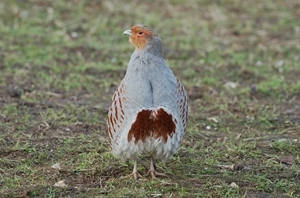 It’s poignant that not so very long ago, the wild grey partridge was a very common bird that flourished on arable farmland across the country. However, in the past 40 years its numbers have plummeted by more than 80 per cent and leading research charity the Game & Wildlife Conservation Trust (GWCT), based in Fordingbridge, Hampshire reports that they have become locally extinct in many areas.
It’s poignant that not so very long ago, the wild grey partridge was a very common bird that flourished on arable farmland across the country. However, in the past 40 years its numbers have plummeted by more than 80 per cent and leading research charity the Game & Wildlife Conservation Trust (GWCT), based in Fordingbridge, Hampshire reports that they have become locally extinct in many areas.
The GWCT continues to research and develop solutions to kick-start recovery. The latest development is an inspiring one-day training course, being held at the Trust’s headquarters in Fordingbridge, Hampshire on 7th November.
The training is based on a three-year research study initiated by the Trust, which investigated the most effective methods of re-establishing a partridge population through releasing and culminated in comprehensive guidelines for practioners.
Dr Francis Buner, the GWCT scientist who led the research project and is part of the training team, said, “Grey partridges suffered a catastrophic breeding season last year because of the appallingly wet summer. As a consequence, the need to re-establish new populations is crucial if we are to save this bird, particularly as there are now huge tracts of our countryside that no longer holds grey partridges. We hope that our comprehensive guidelines and this training will show the art of the possible.”
Re-establishing a wild population where they are no longer present is certainly not for the faint-hearted. Dr Buner continues, “Once the right habitats have been created and feeding and predator control are being maintained, we feel confident that many people will be able to have wild partridges on their land again. This would be a fantastic achievement for future generations.”
The training day involves a combination of presentations and practical sessions. This in-depth course is designed to help clarify and guide people through some of the pitfalls and will offer lots of tips and encouragement to help ensure a positive and successful outcome.
In any re-introduction project, attention to detail is paramount and the day will be run by both Roger Draycott and Francis Buner from the Trust as well as Dr David Butler, a gamebird biologist from Perdix Wildlife, who specialise in rearing grey partridges for re-introduction programmes.
Dr Roger Draycott said, “This course is relevant to everyone interested in grey partridge conservation, from farmers or conservation groups looking to re-establish a small but viable resident population on their land to game managers whose ultimate goal is to achieve a sustainable wild grey partridge shoot.”
The one-day course on the 7th November costs £66 per person including lunch and can be booked by contacting Lynda Ferguson on 01425 651013 or email: advisory@gwct.org.uk. Alternatively book online:www.gwct.org.uk/courses.
END
Photocaption: Where they are now locally extinct, the Game & Wildlife Conservation Trust is offering training to help re-establish new populations.
Notes to editors
The Game & Wildlife Conservation Trust – providing research-led conservation for a thriving countryside. The GWCT is an independent wildlife conservation charity which has carried out scientific research into Britain’s game and wildlife since the 1930s. We advise farmers and landowners on improving wildlife habitats. We employ more than 60 post-doctoral scientists and other research staff with expertise in areas such as birds, insects, mammals, farming, fish and statistics. We undertake our own research as well as projects funded by contract and grant-aid from government and private bodies.
For information, contact:
Eleanor Williams
Telephone: 07592 025476
Email: press@gwct.org.uk